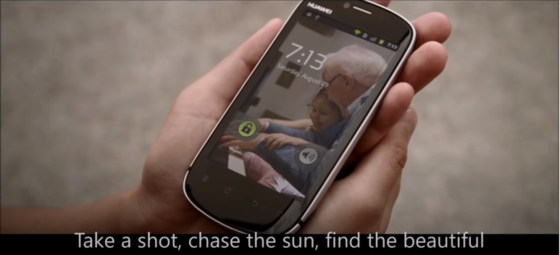It’s a song you’ve heard of at least once, Huawei’s signature song 《Dream it Possible》. It is a story of a girl struggling for her dream of’music’. It is a song about endless efforts and persistence.
In the music video, a grandfather appears as the girl’s assistant, and with his affectionate advice, interest, and support, the girl grows into a talented pianist. After that, he became an eminent performer and entered the best concert hall to perform, and the music video ends.
The original song is 《Dream it Possible》 by American singer Delacy. In 2015, Huawei CEO Ren Jungfei was impressed when he heard the song by chance. This is because I felt that the message of’constant effort and progress’ coincided with Huawei’s corporate philosophy.

Huawei mobile phone that appeared in the music video ⓒDream It Possible YouTube capture
At the time of 2015, Huawei won the title of the world’s largest telecommunication equipment manufacturer, but only a few consumers are interested in smartphones.
Ren Jungpay spent 80 million yuan (about 13.9 billion won) just to buy the copyright for the song. Of course, it is a small amount than the cost of research and development on smartphones, but it is a huge investment in a single sound source. After buying the copyright, Ren Jungfei hired a Chinese singer to release an album and make a music video.
The singer who sang the song is Jane Zhang, a singer who has established a firm position in the Chinese popular music scene. After passing the audition, she was deeply moved by the meaning of the song and requested a Chinese version. Later, the Chinese version of 《我的梦, Wotherm》 was released.

Zhang Liangying (張?穎) ⓒ Baidu Biker
When the song was released, it became a hot topic not only for Huawei users but also across China. With impressive lyrics and magnificent arrangements, it proudly took the top spot on major music charts.
Netizens responded positively, such as “showing confidence and determination in their dreams and future” and “It seems to encourage everyone to pursue their dreams bravely and persistently.”

Zhang Liangying (張?穎) ⓒ Baidu Biker
Some consumers wondered how much the telecommunications equipment manufacturer was investing in a single song. However, this representative song helped to pioneer the overseas market as well as domestic demand.
Overseas consumers also turned their attention to Huawei, saying, “I liked the song so much that I looked for a brand.” Huawei collected 60% of its total sales overseas as of 2015.
Whether by coincidence or inevitable, Huawei’s 2015 sales exceeded $20 billion, an increase of nearly 70% compared to 2014. In addition, Huawei shipped 108 million smartphones in 2015, an increase of 44% from the previous year, solidifying its position as China’s leading smartphone manufacturer, which set a landmark record.

Chairman Ren Jung Pei ⓒ Baidu Image
Four months after the release of the representative song, in the first quarter of 2016, it sold more than 28 million smartphones, recording a growth rate of 59%. The global market share also increased from 5.4% to 8.3%.
The sound source is basically recorded on Huawei smartphones and has been loved by many people until now in 2021. What kind of dream did Ren Jung-pei have at the time, who made a’big investment’ in one song?
China Lab = Kim Eun-soo, editor

China Lab
